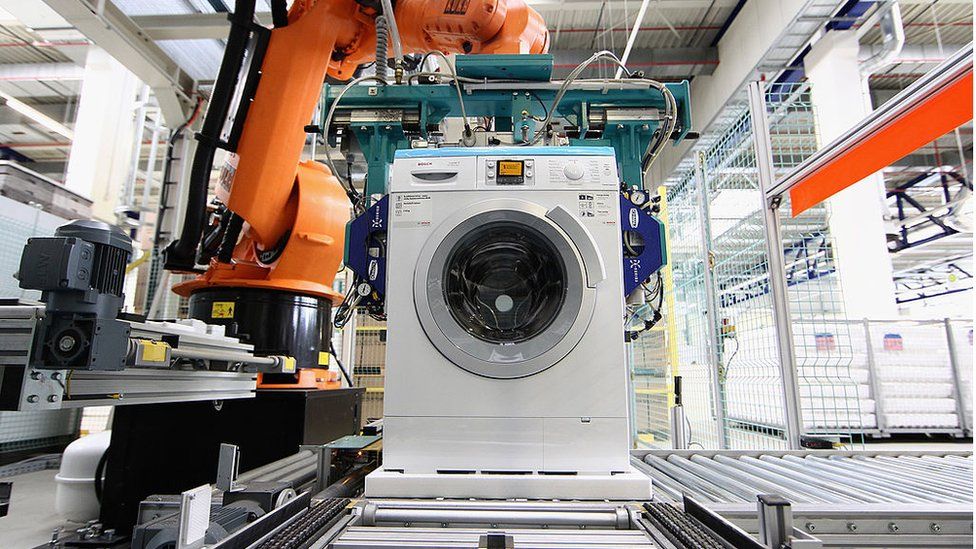Appliances will be cheaper to own, the government says, under plans that will extend the lifespan of household goods.

image copyrightGetty Images
Washing machines, TVs and fridges will be cheaper to own under a new legal right for repairs, the government says.
From Thursday, manufacturers will have to make spares available to consumers, with the aim of extending the lifespan of products by up to 10 years, it said.
Higher energy standards this year will also knock an average of £75 per year off energy bills, the government said.
However, one company said that the new rules could make white goods more expensive.
The right to repair rules are designed to tackle “built-in obsolescence” where manufacturers deliberately build appliances to break down after a certain period to encourage consumers to buy new ones.
Manufacturers will now be legally obliged to make spare parts available to consumers so appliances can be fixed.
Changes to energy efficiency standards this year will also mean savings for consumers and cut eight megatonnes of carbon emissions in 2021 by reducing how power-hungry goods are, the government said.
Since March, there have also been changes to appliance energy efficiency labelling.
Energy minister Anne Marie Trevelyan said: “The tougher standards will ensure more of our electrical goods can be fixed rather than have to be thrown away when they stop working, putting more money back in the pockets of consumers.”
Climate change minister Lord Callanan added: “We can all play our part in ending our contribution to climate change, even when we’re choosing a new electrical appliance.”


These new rules should bring an end to the frustration of having to throw away an item because a small part is no longer working and no longer in stock.
Often the seal around a fridge, the detergent drawer on a washing machine, or the runners on a dishwasher break. Rather than having to buy a whole new product, replacement parts must now be sold directly by the manufacturer for 10 years, whether or not they are still selling the complete item in their range.
This isn’t a law about who is responsible for the repair. If it’s still within warranty, then the manufacturer or the retailer should repair it, but after that, you are at least now guaranteed access to a replacement part. You’ll probably have to buy it, and you may have to pay someone to fit it if it’s a complicated internal part, but at least you should be able to get hold of it.
Having the right to repair is a step removed from having the confidence to actually attempt one, though. It’s a much bigger cultural shift to convince people to fix it and not to fling it.

Environmental expert Libby Peake, head of resource policy at Green Alliance, said that the new regulations “represent a small, first step towards giving people the long-lasting repairable products they want”.
However, she said it was not accurate to say the new rules create a “legal right to repair”.
“The government hasn’t given consumers any such right, as the spare parts and repairability criteria are only directed at professional repairers, not at the people who own products,” she said.
“There is also no guarantee that spare parts and repair services will be affordable, so considerable barriers remain to making this the easiest, default option,” she added.
Green Alliance called on the government to “increase its ambition in this area, so that it really is as easy as possible for people to repair and upgrade the products they own”.

One company said the legislation could make appliances more expensive. John Elliot, executive chairman of Ebac, said his business had always focused on the long-term reliability of a product.
“We don’t look to make the cheapest washing machine. We look for one that’s going to do the job and last a long time,” he said.
The firm has been manufacturing dehumidifiers, water coolers and washing machines for five decades, at Newton Aycliffe, County Durham.
“Our focus is reliability – not just a low initial cost,” Mr Elliot said. “The secret of a product that’s easy to repair and long-lasting is in the design.”
Overall, Mr Elliot said, the legislation will not make much difference to his business. But it will to competitors, who have been in a race to the bottom on prices for many white goods.
“I can’t think of one example where we could not repair a product,” he added. “I checked, and the oldest machine we repaired was 25 years old.”
Rob Johnson, operations director at repair business Pacifica, said that his firm was now hoping to recruit engineers because of the new rules.
The company already has 400 qualified engineers going into homes to fix about 6,000 appliances per week.
He said the legislation “gives customers real choice” about whether to repair or replace their product.
Google and YouTube had built confidence in tackling some basic repairs at home. However, he said that business was still brisk for quick fixes to items such as dishwasher filters, washing machine seals and broken fridge or freezer doors.
There’s also an upside for the environment, too, he said, adding: “The legislation is designed to reduce impact of electrical waste.
“So we really want consumers to take that opportunity to think about whether they should repair it rather than replace it. And that can mean trying to repair it themselves or call someone out like ourselves.”
People have different comfort levels when it comes to the thought of tackling home repairs on appliances, according to YouGov research for BBC News.
Men said they felt more comfortable than women in trying to fix appliances across the board.
Most of the appliances featured in the new legislation can be found in the kitchen. However, data suggests few feel comfortable taking advantage of the increased availability of spare parts.
Of the kitchen appliances covered under the new rules, Britons are most comfortable repairing their washing machines (22%) including some one-in-three men (32%) and half as many women (14%). But people are less comfortable with dishwashers (16%).